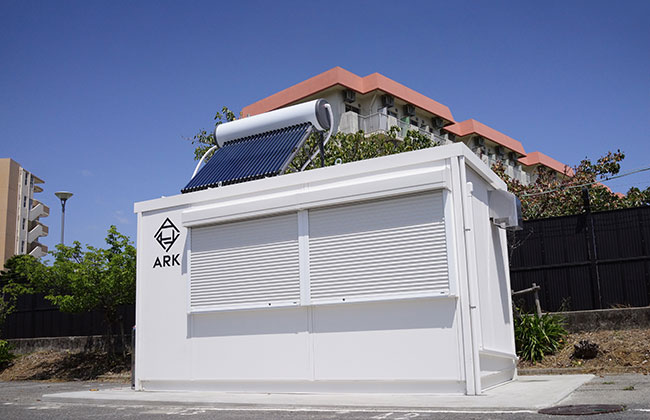
Features
From the Editor: All shapes and sizes
August 22, 2023 By Jean Ko Din
 ARK-V1 at Ryukyu Univeristy (Photo: ARK Inc.)
ARK-V1 at Ryukyu Univeristy (Photo: ARK Inc.) This issue is a bit of a showcase of the different shapes and sizes that recirculating aquaculture systems can be designed. It emphasizes to me how versatile and disruptive this technology can truly be.
On the other hand, I’ve also seen how difficult it is to establish standards or best practices that can apply across the industry. It’s a balancing act that is interesting to watch.
The cover story is definitely one that will catch the eye. Last issue, we explored the idea of smaller scale, more simplified RAS as a prudent foray into land-based production, but here’s ARK Inc. that is taking it to another level. With its prototype about the size of a shipping container, these micro RAS units could really shorten that distance from the farm to the table.
Bonnie Waycott’s story talks about how planting these units closer to communities could become a game-changer for local food security, especially in a city like Fukushima. It’s exciting to see the possibilities of new projects like these that are thinking outside the box – or rather, thinking in a smaller box.
On the other side of the spectrum, we feature Salmon Evolution. I share an expert of a recent RAS Talk episode with CEO Trond Håkon Schaug-Pettersen about the company’s first large-scale facility and its plans of becoming even larger.
Whether it’s ARK Inc.’s micro RAS box or Salmon Evolution’s hybrid megafarm, sustainability must be an integral part of the system design. It’s a more complex challenge as Salmon Evolution works its way to its 31,500 tonnes capacity goal for 2028, but I’m glad that it’s something that is being talked about at Phase One (7,900 tonnes).
Schaug-Pettersen gave us the example of one company initiative in which they are capturing their solid waste and turning it into a rich fertilizer ingredient for local farmers.
I wish I had also asked him about the company’s push to be run on 100 per cent renewable energy. This company is truly leading in having both a profitable and sustainable business.
If this issue were to have a secondary theme, it would definitely be the circular economy. Lethbridge College just opened its doors to a brand new recirculating facility with the goal of exploring the potential of aquaponics.
This aquaculture research institute is prioritizing the future of circular food production. They are conducting a series of different studies of how fish waste can feed plant production. You know what they say, one fish’s trash can be a plant’s nutrient treasure. With 51 brand new modules, I’m sure there are new RAS frontiers just waiting to be explored.
Speaking of new frontiers, I’d like to enlist your help in finding more stories like the ones from this issue. I’m sure there are interesting RAS projects out there that we are overlooking. There are no projects too small or too specific that the general industry can’t learn or derive inspiration from. I want to truly challenge myself and the editorial team to find new stories in new places.
I would also like to take this opportunity to invite you all to take a look our the RAS Talk podcast with myself and Brian Vinci, director of Freshwater Institute. New projects are something that we explore on a monthly basis. You can send me your ideas at jkodin@annexbusinessmedia.com.
Print this page